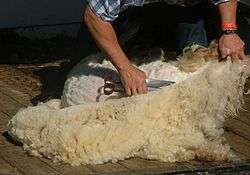wool
See also: Wool
English

A sheep being sheared for its wool.
Etymology
From Middle English wolle, from Old English wull, from Proto-Germanic *wullō (cognate with Saterland Frisian Wulle, German Low German Wull, Dutch wol, German Wolle, Norwegian ull), from Proto-Indo-European *h₂wĺ̥h₁neh₂ (compare Welsh gwlân, Latin lāna, Lithuanian vìlna, Russian во́лос (vólos), Bulgarian влас (vlas), Albanian lesh (“wool, hair, fleece”)).
Pronunciation
- (Received Pronunciation) IPA(key): /wʊl/
- (General American) enPR: wo͝ol, IPA(key): /wʊl/, [wʊ̠ɫ], [wɫ̩]
Audio (US) (file) - Rhymes: -ʊl
Noun
wool (usually uncountable, plural wools)
- The hair of the sheep, llama and some other ruminants.
- 2006, Nigel Guy Wilson, Ancient Greece, page 692
- The sheep were caught and plucked, because shears had not yet been invented to cut the wool from the sheep's back.
- 2006, Nigel Guy Wilson, Ancient Greece, page 692
- A cloth or yarn made from the wool of sheep.
- 2009, January 12, “Mireya Navarro”, in It May Market Organic Alternatives, but Is Your Cleaner Really Greener?:
- Spielvogel said wet cleaning also has limitations; while it is fine for cottons and fabrics worn in warm climates, he said, it can damage heavy wools or structured clothes like suit jackets.
-
- Anything with a texture like that of wool.
- 1975, Anthony Julian Huxley, Plant and Planet, page 223
- The groundsels have leaves covered in wool for insulation […]
- 1975, Anthony Julian Huxley, Plant and Planet, page 223
- A fine fiber obtained from the leaves of certain trees, such as firs and pines.
- (obsolete) Short, thick hair, especially when crisped or curled.
- Shakespeare
- wool of bat and tongue of dog
- Shakespeare
- (Britain, New Zealand) yarn (including that which is made from synthetic fibers.)
Derived terms
- andalusian wool
- breech wool
- burry wool
- cotton wool
- dead pulled wool
- dyed in the wool
- fleece wool
- glass wool
- ice wool
- mineral wool
- much cry and little wool
- pull the wool over somebody's eyes
- rag wool
- scoured wool
- seed wool
- Shetland wool
- shorn wool
- steel wool
- thibet wool
- virgin wool
- warm as wool
- waste of wool
- wire wool
- wool classer
- woolgathering
- wool grease
- woollen, woolen
- woolly, wooly
- wool oil
Translations
hair of sheep, etc.
|
|
cloth or yarn
|
|
Cornish
This article is issued from
Wiktionary.
The text is licensed under Creative
Commons - Attribution - Sharealike.
Additional terms may apply for the media files.